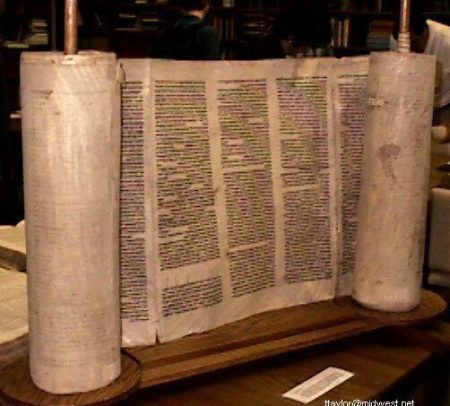No, I am not going to review the story- who doesn’t know about “The Flood”? Some interesting points: Noah did not bring in all the animals two-by-two: he brought in the clean animals seven-by-seven, and the unclean two-by-two; He first
This past Monday, the 24th, was the celebration of Sh’mini Atzeret, the Eighth Day. This is also called Simchat Torah, or Joy of Torah. The joy is that we read the last sentence or two of D’varim (Deuteronomy) and then,
This parashah is the one between the end and start of the Torah reading schedule. On the eighth day of Sukkot, called Sh’mini Atzeret (also called Simchat Torah, Joy of Torah) we celebrate turning the Torah back from the end
Moses foretells the future, and warns the people about turning from God to idols. He tells them that they are making a covenant with God not just for themselves, but for their descendants, as well. The world will offer them
We start with the end of the Second Discourse of Moses when we finish Chapter 26. The First Discourse was a review of the journey, the Second Discourse a review of the laws and codes given by God, and the
We know that this last book of the Torah is a recap of the entire Torah, reaffirming the laws, regulations and commandments that God gave to everyone (Jew and Gentile, alike) through Moses. This parashah covers many of the civil
“Justice, Justice shalt thou follow, that thou mayest live, and inherit the land which the Lord thy God giveth thee.” These are the words found in this Shabbat Parashah (16:20) and the rest of this parashah discusses how that justice
This parashah, as with the entire book of D’Varim (Deuteronomy) is a retelling of all the things that have happened over the past 40 years, with a reordering of the commandments, rules and regulations under which the people of Israel
This parashah has Moses delivering the same message to the Israelites repeated three times; essentially, Moses is telling them that “God has your back!” He retells about the 40 years in the desert, the way God handled the Egyptians (and
Moses completes his First Discourse, going into detail about how God has separated the Jewish people from the other nations by his laws, ordinances and (more than anything else) His continual presence and the miraculous works He has performed for His
This is the 5th and last book of the Torah. Moses gives three discourses: the first is review of their 40 year journey, the second (beginning at 4:44) deals with the foundations of the covenant with a review of the laws
The previous parashah ended with Moses reviewing for the people the commandments regarding sacrifices and the Holy Days. Now he continues with the laws regarding vows. These three things- sacrifice, Festivals and vows- form the basis of worship. The people are

